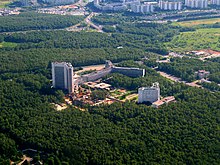Slushba wneschnei rasvedki
| founding | December 1991 |
| country |
|
| Task of the authority | Foreign intelligence service |
| director | Sergei Naryshkin |
| Authority seat | Jassenewo |
| budget | secret |
| Number of full-time employees | 13,000 |
The Sluschba wneschnei raswedki ( SWR ; Russian Служба внешней разведки Российской Федерации , СВР; German Foreign Intelligence Service of the Russian Federation ) is the Russian foreign intelligence service .
activities
The SWR's fields of activity include politics , economics , science and technology .
In addition, the secret service tries to investigate the activities and working methods of other intelligence services ( counter-espionage ). During the restructuring of the Russian intelligence services, SWR was assigned tasks in the field of telecommunications intelligence .
The headquarters of the service is in Jassenewo on the southern outskirts of Moscow. The service has around 13,000 employees. Full-time SWR employees abroad disguise themselves as diplomats or journalists. Agents with fake names and constructed biographies are coordinated in "Main Department S" and placed in various important countries.
history
On December 20, 1920 Felix Dzerzhinsky signed the order No. 169 for the establishment of a foreign intelligence department (Russian Иностранный отдел , Inostranny otdel , ИНО , INO for short ). It was the hour of birth of civilian foreign intelligence in the Soviet Union . Until then, there had only been a special department for military foreign intelligence, which also dealt with civil issues. Today's SWR regards itself as INO's successor. The 80th and 90th INO anniversaries were celebrated by the SWR.
The Soviet Union's civil intelligence abroad changed its supervisory authority several times: On February 22, 1922, the INO was assigned to the State Political Directorate (GPU) as a foreign department. All intelligence activities abroad were assigned to her. This included the collection of important information in other countries, the liquidation of defectors, emigrants and so-called "enemies of the people". From 1923 to 1934, the INO of the United State Political Administration belonged Council of People's Commissars of the Soviet Union ( Объединённое государственное политическое управление при СНК СССР , Obedinjonnoje State Political Directorate pri SNK SSSR ). In July 1934 the INO was incorporated into the Interior Ministry of the USSR (NKVD) . In 1941 the INO became the INU of the People's Commissariat for State Security (NKGB) , and in 1954 it became the First Headquarters (PGU) of the KGB .
After the failed August putsch in Moscow , the PGU was replaced by the ZSR (Zentralnaja Sluschba Raswedki, German: Central Intelligence Service) in October 1991. In December 1991 the ZSR merged with the SWR. First director of the SWR 1991 to 1996 was Yevgeny Primakov . He was followed by Vyacheslav Trubnikov (1996–2000), Sergei Lebedew (2000–2007), Mikhail Fradkow (2007–2016) and Sergei Naryschkin (from October 5, 2016).
management
Web links
- Official website
- FAS.org, Federation of American Scientists A brief outline of the development of the SWR (English)
Individual evidence
- ↑ a b Uwe Müller, Lars-Marten Nagel, Julia Smirnova: Germany in the sights of Moscow's agents In: welt.de of February 10, 2013
- ↑ Federal Office for the Protection of the Constitution: Report on the Protection of the Constitution 2011 (PDF; 6.0 MB), July 18, 2012
Coordinates: 55 ° 35 ′ 5.9 ″ N , 37 ° 31 ′ 4.6 ″ E






